Jim Kenyon: Dartmouth basketball team has right to unionization vote, ruling says
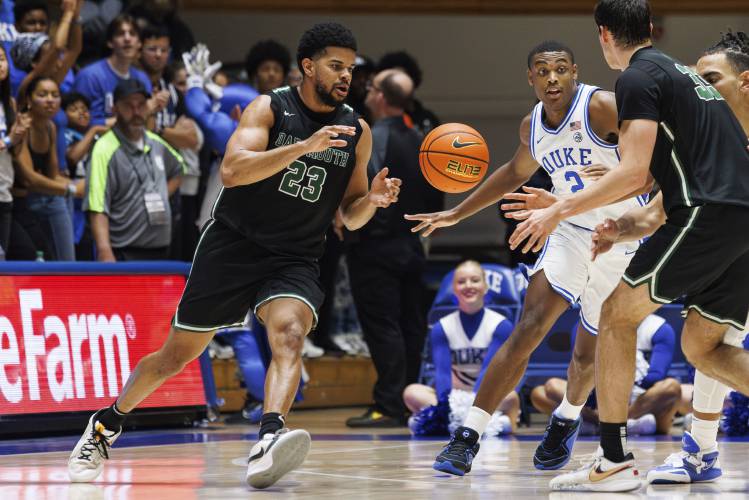
Dartmouth's Robert McRae III (23) takes a pass from Jackson Munro (33) as Duke's Jaylen Blakes (2) defends during the second half of an NCAA college basketball game in Durham, N.C., Monday, Nov. 6, 2023. Men's basketball players for Dartmouth are attempting to unionize, filing a petition with the National Labor Relations Board in September. (AP Photo/Ben McKeown) Ben McKeown
|
Published: 02-05-2024 10:31 PM
Modified: 02-08-2024 9:40 AM |
The Dartmouth College men’s basketball team hasn’t won many games on the court this season, but the players scored a major victory Monday in their bid to unionize.
Laura Sacks, director of the National Labor Relations Board’s regional office in Boston, ruled in favor of the 15 players, ordering a union election be held on campus at a future date.
Dartmouth, through its attorneys, argued the players are “student-athletes,” and not employees of the college. Sacks, however, disagreed.
“Because Dartmouth has the right to control the work performed by the Dartmouth men’s basketball team, and the players perform that work in exchange for compensation, I find the petitioned-for basketball players are employees within the meaning of the (National Labor Relations) Act,” Sacks wrote in her decision.
Juniors Cade Haskins and Romeo Myrthil, the team’s spokesmen, called Sacks’ ruling a “significant step forward for college athletes, and we are excited to see how this decision will impact college sports nationwide.”
In a statement released Monday evening, Diana Lawrence, a college spokeswoman, said that Dartmouth athletes’ “primary focus is learning, and our guiding principle is that students are scholars first and athletes second.”
Lawrence added that “unlike other institutions where athletics generates millions of dollars in net revenue, the costs of Dartmouth’s athletics program far exceed any revenue from the program — costs that Dartmouth bears as part of our participation in the Ivy League. We also do not compensate our athletes, nor do we provide athletic scholarships; all our scholarships are based on financial need.”
At Dartmouth, “we believe firmly that unionization is not appropriate in this instance and we will be seeking a review of the decision.”
Article continues after...
Yesterday's Most Read Articles
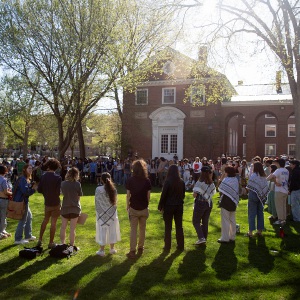 Dartmouth administration faces fierce criticism over protest arrests
Dartmouth administration faces fierce criticism over protest arrests
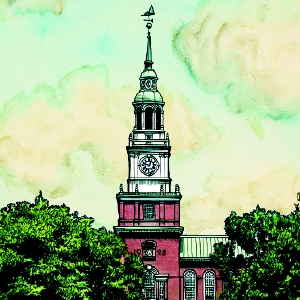 Three vie for two Hanover Selectboard seats
Three vie for two Hanover Selectboard seats
 A Look Back: Upper Valley dining scene changes with the times
A Look Back: Upper Valley dining scene changes with the times
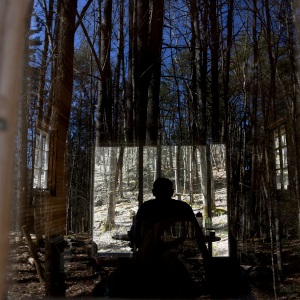 Norwich author and educator sees schools as a reflection of communities
Norwich author and educator sees schools as a reflection of communities
The players are trying to become the first collegiate athletic team in the country to unionize. In September, all 15 team members signed cards, indicating they wanted to join Local 560 of the Service Employees International Union, or SEIU, for short. The SEIU has represented the college’s blue-collar workers since 1966.
Local 560 President Chris Peck, a painter at the college, said it’s the union’s understanding that Dartmouth will appeal Monday’s ruling. President Sian Leah Beilock is “missing an opportunity to make history with these courageous students,” Peck said. The NLRB’s Boston office “saw through Dartmouth’s arguments and we fully expect the National Board will too.”
Sacks’ decision follows a four-day NLRB hearing held in October. The players, whose legal bills are being picked up by the SEIU, argued they deserve to be compensated in the same fashion as other student-workers at Dartmouth.
A player can be an “athlete, a student and an employee at the same time,” SEIU attorney John Krupski wrote in a post-hearing brief filed in late October. “It is indisputable that the players perform valuable services for the college through their work on and off the basketball court.”
In addition to games, practices and out-of-season training sessions, players are also required to help with fundraising, Krupski said.
Eleven of the 15 players receive financial aid that covers all or much of their college costs, but it still leaves them short.
“Many of our players currently juggle part-time jobs alongside their academic and athletic commitments to help pay for their tuition and living expenses,” Haskins and Myrthil wrote in an op-ed that appeared in the college’s student newspaper, The Dartmouth, last fall.
Players receive what is called “non-traditional compensation,” in the form of equipment and apparel, including roughly $1,200 a year for six pairs of basketball shoes. But that doesn’t cover their bills.
In talking with players at the beginning of the season for a Dec. 4 column, they told me they hope to get paid along the same lines as Dartmouth’s student dining hall workers, who make about $20 an hour after unionizing. For basketball players that would work out to be about 10,000 a year.
Players are looking to negotiate more than just wages. In their op-ed, Haskins and Myrthil wrote that “several of our players have suffered serious injuries during practices or games and needed to pay substantial amounts of money out of pocket to cover their health insurance deductibles.”
To fight the union effort, the college hired a Boston firm, Morgan, Brown & Joy, which promotes itself as the “oldest and largest management-side employment law firm in New England.”
Through its attorneys, Dartmouth has argued that the players are “student-athletes” who voluntarily participate in an extracurricular activity.
The basketball program has suffered losses totaling nearly $3.3 million in the last five years, the college told the NLRB. “It is undisputed that the men’s basketball program provides no economic benefit to the College whatsoever,” Dartmouth’s attorneys wrote in their post-hearing brief.
The college downplayed the players’ role in fundraising through the Friends of Dartmouth Basketball, a group consisting mostly of alums, that raised $304,000 for the men’s and women’s basketball programs last year.
There’s “no evidence” that players on the basketball team, which has compiled a 5-14 win-loss record so far this season, are required to “participate in fundraising activities, solicit donations, or are otherwise responsible for fundraising,” the college’s attorneys argued.
In her decision, Sacks noted that “players have also been asked to promote the team and Dartmouth athletics on social media.”
Sack s has called for the NLRB to conduct a “secret ballot election” among the 15 players that will determine “whether or not they wish to be represented for purposes of collective bargaining” by SEIU Local 560.
Jim Kenyon can be reached at jkenyon@vnews.com.

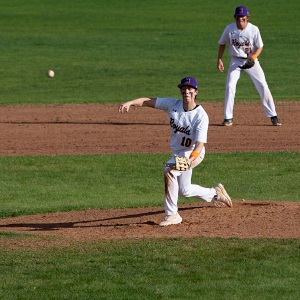 Local Roundup: Hartford tops Woodstock in close girls lacrosse contest
Local Roundup: Hartford tops Woodstock in close girls lacrosse contest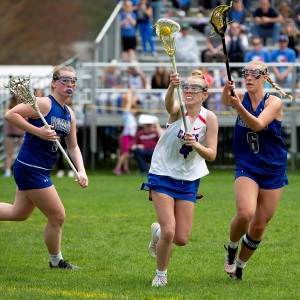 Hurricanes earn 10-9 victory over U-32 in girls lacrosse
Hurricanes earn 10-9 victory over U-32 in girls lacrosse Stevens, Newport baseball split high-scoring games
Stevens, Newport baseball split high-scoring games Lebanon High senior comes to the aid of driver with health problem
Lebanon High senior comes to the aid of driver with health problem
